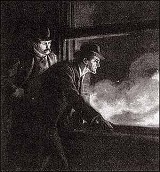“My dear fellow, you shall keep watch in the street. I’ll do the criminal part. It’s not a time to stick at trifles. Think of Mycroft’s note, of the Admiralty, the Cabinet, the exalted person who waits for news. We are bound to go.”
My answer was to rise from the table.
“You are right, Holmes. We are bound to go.”
He sprang up and shook me by the hand.
“I knew you would not shrink at the last,” said he, and for a moment I saw something in his eyes which was nearer to tenderness than I had ever seen. The next instant he was his masterful, practical self once more.
“It is nearly half a mile, but there is no hurry. Let us walk,” said he. “Don’t drop the instruments, I beg. Your arrest as a suspicious character would be a most unfortunate complication.”
Caulfield Gardens was one of those lines of flat-faced pillared, and porticoed houses which are so prominent a product of the middle Victorian epoch in the West End of London. Next door there appeared to be a children’s party, for the merry buzz of young voices and the clatter of a piano resounded through the night. The fog still hung about and screened us with its friendly shade. Holmes had lit his lantern and flashed it upon the massive door.
“This is a serious proposition,” said he. “It is certainly bolted as well as locked. We would do better in the area. There is an excellent archway down yonder in case a too zealous policeman should intrude. Give me a hand, Watson, and I’ll do the same for you.”
A minute later we were both in the area. Hardly had we reached the dark shadows before the step of the policeman was heard in the fog above. As its soft rhythm died away, Holmes set to work upon the lower door. I saw him stoop and strain until with a sharp crash it flew open. We sprang through into the dark passage, closing the area door behind us. Holmes led the way up the curving, uncarpeted stair. His little fan of yellow light shone upon a low window.
“Here we are, Watson - this must be the one.” He threw it open, and as he did so there was a low, harsh murmur, growing steadily into a loud roar as a train dashed past us in the darkness. Holmes swept his light along the window-sill. It was thickly coated with soot from the passing engines, but the black surface was blurred and rubbed in places.

“You can see where they rested the body. Halloa, Watson! what is this? There can be no doubt that it is a blood mark.” He was pointing to faint discolourations along the woodwork of the window. “Here it is on the stone of the stair also. The demonstration is complete. Let us stay here until a train stops.”
We had not long to wait. The very next train roared from the tunnel as before, but slowed in the open, and then, with a creaking of brakes, pulled up immediately beneath us. It was not four feet from the window-ledge to the roof of the carriages. Holmes softly closed the window.
“So far we are justified,” said he. “What do you think of it, Watson?”
“A masterpiece. You have never risen to a greater height.”
“I cannot agree with you there. From the moment that I conceived the idea of the body being upon the roof, which surely was not a very abstruse one, all the rest was inevitable. If it were not for the grave interests involved the affair up to this point would be insignificant. Our difficulties are still before us. But perhaps we may find something here which may help us.”